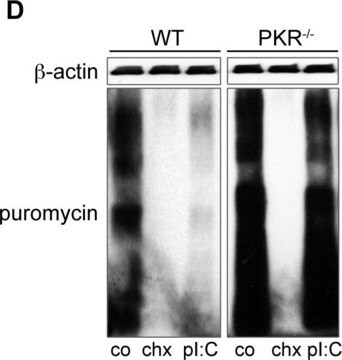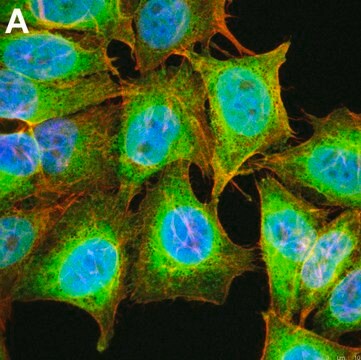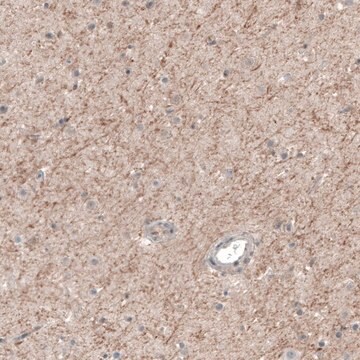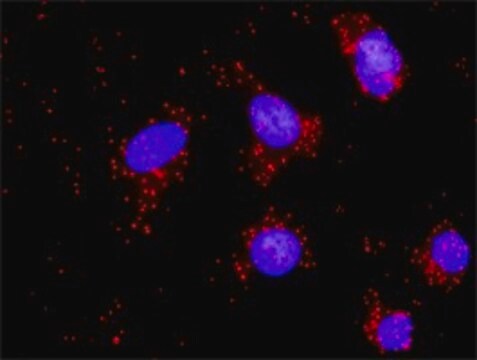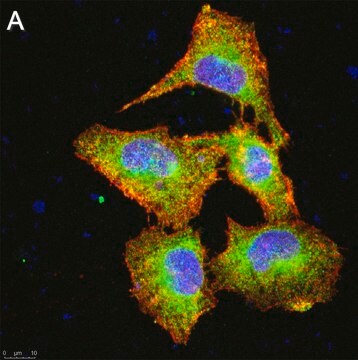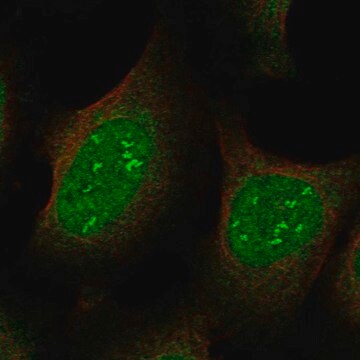MABF920
Anti-SAP/SH2D1A Antibody, clone 1A9
clone 1A9, from rat
Sinonimo/i:
SH2 domain-containing protein 1A, Signaling lymphocytic activation molecule-associated protein, SLAM-associated protein, T-cell signal transduction molecule SAP
About This Item
WB
western blot: suitable
Prodotti consigliati
Origine biologica
rat
Livello qualitativo
Forma dell’anticorpo
purified antibody
Tipo di anticorpo
primary antibodies
Clone
1A9, monoclonal
Reattività contro le specie
mouse, human
tecniche
flow cytometry: suitable
western blot: suitable
Isotipo
IgG2aκ
N° accesso NCBI
N° accesso UniProt
Condizioni di spedizione
wet ice
modifica post-traduzionali bersaglio
unmodified
Informazioni sul gene
human ... SH2D1A(4068)
Descrizione generale
Specificità
Immunogeno
Applicazioni
Inflammation & Immunology
Immunological Signaling
Flow Cytometry Analysis: A representative lot immunostained wild-type, but not sh2d1a-knockout, murine peripheral blood CD3+CD4+ lymphocytes (Zhong, M.C., and Veillette, A. (2013). Mol. Cell. Biol. 33(6):1223-1232).
Western Blotting Analysis: A representative lot detected SAP, but not EAT-2 or ERT, exogenously expressed in the mouse mature mouse T cell line BI-141 (Roncagalli, R., et al. (2005). Nat. Immunol. 6(10):1002-1010).
Qualità
Flow Cytometry Analysis: 0.1 µg of this antibody detected SAP/SH2D1A in mouse splenocytes.
Descrizione del bersaglio
Stato fisico
Stoccaggio e stabilità
Altre note
Esclusione di responsabilità
Non trovi il prodotto giusto?
Prova il nostro Motore di ricerca dei prodotti.
Codice della classe di stoccaggio
12 - Non Combustible Liquids
Classe di pericolosità dell'acqua (WGK)
WGK 1
Punto d’infiammabilità (°F)
Not applicable
Punto d’infiammabilità (°C)
Not applicable
Certificati d'analisi (COA)
Cerca il Certificati d'analisi (COA) digitando il numero di lotto/batch corrispondente. I numeri di lotto o di batch sono stampati sull'etichetta dei prodotti dopo la parola ‘Lotto’ o ‘Batch’.
Possiedi già questo prodotto?
I documenti relativi ai prodotti acquistati recentemente sono disponibili nell’Archivio dei documenti.
Il team dei nostri ricercatori vanta grande esperienza in tutte le aree della ricerca quali Life Science, scienza dei materiali, sintesi chimica, cromatografia, discipline analitiche, ecc..
Contatta l'Assistenza Tecnica.

